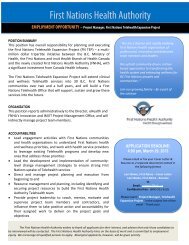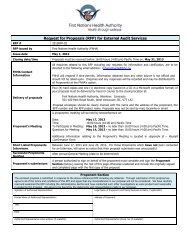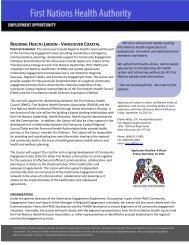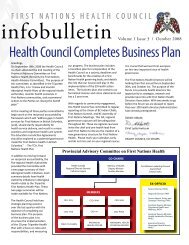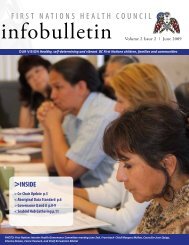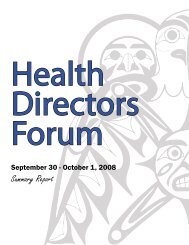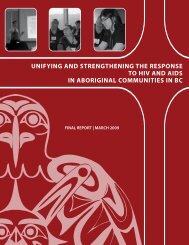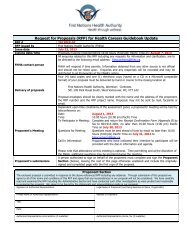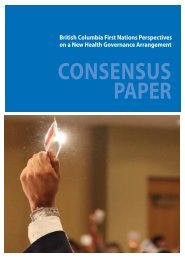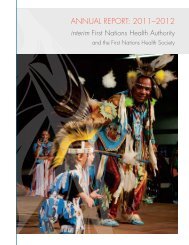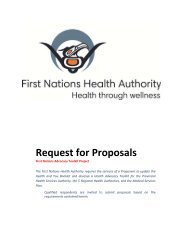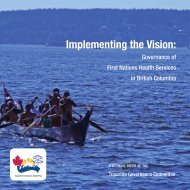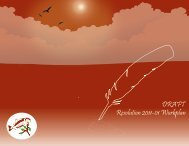pdf download - First Nations Health Council
pdf download - First Nations Health Council
pdf download - First Nations Health Council
Create successful ePaper yourself
Turn your PDF publications into a flip-book with our unique Google optimized e-Paper software.
GATHERING THE COLLECTIVE WISDOM<br />
16<br />
The Tripartite <strong>First</strong> <strong>Nations</strong> <strong>Health</strong> Plan contains<br />
29 action items divided into four key areas of<br />
action: <strong>Health</strong> Promotion, Disease and Injury<br />
Prevention; <strong>Health</strong> Services; Performance Tracking;<br />
and Governance, Relationships and Accountability.<br />
Participants were invited to engage in a<br />
dialogue through a collaborative World Café<br />
discussion process that enabled them to provide<br />
input and share their ideas on up to sixteen of the<br />
specific action items within the <strong>First</strong> <strong>Nations</strong> <strong>Health</strong><br />
Plan Through these conversations, participants<br />
discussed how to move forward in <strong>First</strong> <strong>Nations</strong><br />
health. What follows is some of the wisdom that<br />
was harvested during those sessions.<br />
OPEN SPACE<br />
Open Space tables provided participants with<br />
an opportunity to record any issue they wished to<br />
raise. The Open Space flip charts also encouraged<br />
people to identify issues they wanted to discuss<br />
and the follow-up they felt could address that<br />
issue. There were four Open Space opportunities<br />
provided during the Gathering, one in each of the<br />
world café breakout rooms. many of the comments<br />
added emphasis to issues already raised in other<br />
parts of the forum (e.g. dentists, on/off reserve,<br />
isolated communities, traditional interventions).<br />
You will find Open Space responses at the end of<br />
each topic.<br />
BREAKOUT GROUP TOPICS<br />
<strong>Health</strong> Promotion, Disease and Injury Prevention<br />
• Holistic <strong>Health</strong> Programs<br />
• ActNow – General<br />
• ActNow - Physical Activity<br />
• ActNow – Nutrition<br />
• Injury Prevention<br />
• Traditional medicine<br />
• Food Security<br />
• Open Space<br />
<strong>Health</strong> Services<br />
• Aboriginal <strong>Health</strong> Human Resources<br />
• E-<strong>Health</strong><br />
• mental <strong>Health</strong><br />
• Access for People with Disabilities<br />
• Universal ECD supports<br />
• Dental<br />
• Open Space<br />
Performance Tracking<br />
• Research Infrastructure<br />
• Indicators<br />
• Regional <strong>Health</strong> Survey<br />
• Community <strong>Health</strong> Plans<br />
• Open Space<br />
Governance, Relationships and Accountability<br />
(This topic was the subject of a separate breakout<br />
session.)<br />
In each of the rooms the Room Host provided<br />
an overall summary of the key messages emerging<br />
from the individual topic discussions. Table Hosts<br />
provided summary notes for the discussions at<br />
each table.<br />
COMMON THEMES<br />
In the conversations it is immediately apparent<br />
that the action items in the health plan are interrelated.<br />
Themes that emerged throughout the<br />
Forum included:<br />
• more must be done to ensure the long<br />
term sustainability of this effort and various<br />
strategies, initiatives and programs.<br />
• There is a need and desire for significant<br />
enhancements to resources in order to expand<br />
the reach of existing programs, including<br />
funding and coordinated/holistic approaches.<br />
• Develop opportunities and materials to support<br />
training and capacity, particularly in response<br />
to needs at the community/front line.<br />
• Leadership needs to continually demonstrate<br />
its commitment and priorities in this area,<br />
including serving as health role models.<br />
• The approach to implementing the TFNHP and<br />
responses to various health needs must be of<br />
practical use at the community level/front line.<br />
• Increase efforts and supports for building cross<br />
cultural understanding between <strong>First</strong> <strong>Nations</strong><br />
and their non-Aboriginal counterparts and<br />
colleagues.<br />
• Provide adequate support to the critically<br />
important area of education and awareness<br />
within <strong>First</strong> <strong>Nations</strong>, Aboriginal and non-<br />
Aboriginal communities.<br />
II<br />
SECONd ANNUAl FORUm



